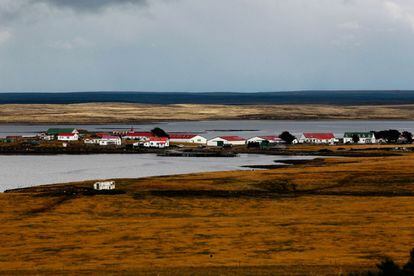A panoramic view of Goose Green, the second city of Malvinas, in 2019.JAVIER LIZÓN
Argentine diplomacy has, with the Government of Alberto Fernández, innumerable deficiencies. It's natural. It is an international policy subjected to a mortifying dissociation. It must express, on the one hand, the populist impulses of Cristina Kirchner and her parishioners, prone to aligning themselves with China and Russia and tolerating tropical tyrannies, such as those of Cuba, Venezuela and Nicaragua, always with the excuse of resisting "Yankee imperialism." On the other hand, he has to coexist and, if necessary, get closer to the United States, Japan and Germany, to achieve Fernández's main external objective: to agree with the International Monetary Fund the renegotiation of a debt of 44,000 million dollars.
Despite the difficulties imposed by this ambivalence, the president claimed a passable victory last Tuesday. He obtained it, to a large extent, because that victory refers to one of the few matters around which Argentines establish a consensus: sovereignty over the Malvinas Islands, whose factual possession is exercised by the United Kingdom. That claim, which is part of the national Constitution, hardly inspires dissidence in the country.
Fernández's trophy was having obtained a pronouncement from several illustrious Spaniards to urge negotiations with London. Among these figures are the four living former heads of government of the Spanish democracy: Felipe González, José María Aznar, José Luis Rodríguez Zapatero and Mariano Rajoy. The declaration, which is the foundation stone of a Dialogue Support Group, shelters in its folds several keys to Spanish politics and Atlantic relations. That's why this episode becomes interesting.
In addition to the former presidents, the declaration was signed by Miguel Ángel Cortés, who was Secretary of State for Ibero-America with Aznar;
José Manuel García-Margallo, Rajoy's chancellor;
Javier Solana, former Secretary General of NATO and High Representative for Foreign Policy of the European Union;
and Manuel Herrero y Rodríguez de Miñón, who is one of the fathers of the Spanish Constitution.
The Argentine ambassador in Madrid, Ricardo Alfonsín, son of the famous Raúl Alfonsín, the first president of the democracy recovered in 1983, was in charge of managing, with cordial personal visits, the manifestation of these figures.
An initiative that takes place within the framework of the 40th anniversary of the Falklands War, which pitted Argentina against the United Kingdom.
The first striking feature of the pronouncement is that it has taken place. It is perhaps the first time that González, Aznar, Zapatero and Rajoy agree on a position on international politics. Sometimes it is difficult to see leaders of the same party reach an agreement. In reference to Latin America there were not many opportunities. They did not achieve it with the peace agreements between the Colombian State and the FARC, nor in the characterization of the Venezuelan tyranny. It means that Argentina and its southern conflict were the excuse for an exercise in consensus that is very unusual not only in Spain but in almost all Western democracies.
The Malvinas issue presents several peculiarities that facilitate this agreement.
A preliminary is that Alfonsín did not ask his Spanish interlocutors to go beyond the canonical formula that has been adopted in the Ibero-American Summits: urge to resume the negotiations, as the UN has been recommending.
Given London's lack of interest in doing so, the request means a tacit endorsement of the Argentine strategy.
Another circumstance facilitates this signal issued from Madrid: without Brexit it could not have been carried out.
It would be unimaginable for a group of European leaders to maintain a discreet bias in favor of Argentina, if the United Kingdom remained part of the European Union.
And that inclination is noticeable in a detail: they speak of the Malvinas, not of the Falklands, which is the name by which the occupying power designates the archipelago.
Favoritism has a fairly obvious subliminal component: it is a way of talking about Gibraltar without having to.
Even when for Spain the vibration of that claim is not as intense as it is for the Argentines that of the Malvinas.
The strength of the claim for sovereignty over these islands is more than emotional and political.
It is associated with material interests.
The sea that surrounds them treasures a great fishing wealth, especially squid.
In addition to a subsoil with oil resources.
For the Argentine governments, approaching the Malvinas is approaching that wealth.
Brexit also changed the commercial dynamics on this level.
Now that the United Kingdom is not part of the Union, Spanish companies, which are hyperactive in the area, must pay a tariff for what they catch.
The Spanish gesture has projections on non-obvious planes. It reinforces an Atlantic link with Argentina, which today is very present in the support of the Government of Pedro Sánchez to the negotiations with the Monetary Fund. Will the designation of Nadia Calviño as senior financial officer of that organization help in any way? It would be exaggerated. But in Buenos Aires they ask.
There is another dimension in which the declaration must be read. The Spanish support the Argentines. It is possible that, in this way, they also compromise them. In the slow motion of the long run, control over the Malvinas acquires a meaning that it did not have before. It is granted by a novelty: China's vocation to have a presence in the Atlantic, especially in the South Atlantic, through which crucial goods circulate for its national economy. Borges joked that "the fight between the British and the Argentines over the Malvinas is the fight between two bald men over a comb." Viewed against the backdrop of tension between the United States and China, the conflict over those small islands might not be so irrelevant now.
Subscribe here to the EL PAÍS América
newsletter
and receive all the key information on current affairs in the region
Sign in to continue reading
Just by having an account you can read this article, it's free
RegisterLogin
Thanks for reading THE COUNTRY

